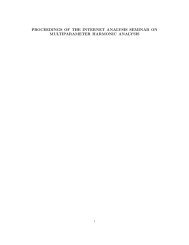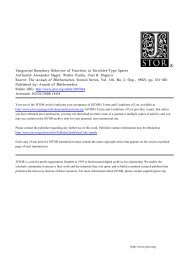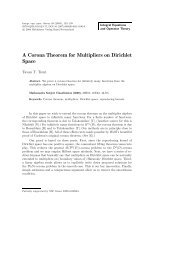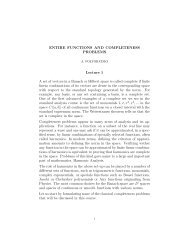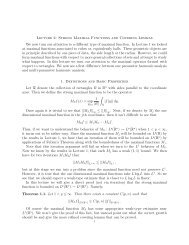Welcome Letter - Internet Analysis Seminar
Welcome Letter - Internet Analysis Seminar
Welcome Letter - Internet Analysis Seminar
Create successful ePaper yourself
Turn your PDF publications into a flip-book with our unique Google optimized e-Paper software.
Dear Colleagues:<br />
The <strong>Internet</strong> <strong>Analysis</strong> <strong>Seminar</strong><br />
<strong>Welcome</strong> to the <strong>Internet</strong> <strong>Analysis</strong> <strong>Seminar</strong> for Fall 2010 - Spring 2011. The <strong>Internet</strong> <strong>Analysis</strong><br />
<strong>Seminar</strong> provides a forum for researchers in the areas of complex analysis, function theory,<br />
harmonic analysis, and operator theory, to interact and learn from one another, both academically<br />
and professionally. The <strong>Seminar</strong> includes three phases involving <strong>Internet</strong> lectures,<br />
working groups, and a final conference. Each year, a topic in the areas mentioned above<br />
will be chosen and an <strong>Internet</strong> seminar will be developed with corresponding lectures. The<br />
<strong>Internet</strong> <strong>Analysis</strong> <strong>Seminar</strong> is generously supported by National Science Foundation DMS #<br />
0955432.<br />
A primary goal of the <strong>Seminar</strong> is to increase the collaborative learning and mentoring<br />
between graduate students, post-doctoral researchers and senior faculty across the country.<br />
The <strong>Seminar</strong> takes the standard dissemination of research results further, providing an open,<br />
inclusive setting for junior mathematicians to learn new research concepts and apply them<br />
through group projects with more senior researchers.<br />
In Phase I (October - February), approximately fifteen weekly, electronic lectures will be<br />
provided via a public website. In Phase II (March - May), participants from Phase I will be<br />
organized into smaller, diverse groups from various institutions to work on more advanced<br />
projects. Phase III consists of a final one-week workshop held in July, during which, teams<br />
will present their projects and additional lectures will be delivered by leading experts in the<br />
field.<br />
The topic of the seminar will be analytic function theory and in particular the Besov-<br />
Sobolev space of analytic functions on the unit disc. In the hopes of giving the students the<br />
quickest introduction to the topics and to provide the most overview many of the results that<br />
were covered focused on the space H 2 (D) and D(D), that Hardy space and Dirichlet space<br />
of the unit disc. In particular, we have omitted (most) of the story about what happens<br />
when 1 < p < ∞ (though frequently may make comments about this). Additionally, we<br />
frequently will make the transition between D and C+ (or sometimes denoted by H) when<br />
the argument is easier in that context. The interested participants should have some basic<br />
complex analysis, real analysis and functional analysis since we will use these tools very<br />
frequently, and sometimes with out much additional comments about it. All lectures will be<br />
written more for the newcomer to the area.<br />
The seminar will first introduce most of the topics necessary for the Hardy space and then<br />
use them as a point of comparison to see what was/is known in the Dirichlet space. The<br />
introduction for the Hardy space will be “mostly” self contained, though there will be some<br />
topics that we will just take as gospel so that we can ultimately proceed to learning about<br />
the story in the Dirichlet space. The topics that will be covered in the seminar include the<br />
following:<br />
• Definitions of these Spaces;<br />
• Computations of their Reproducing Kernels;<br />
• Definitions of their Carleson measures and Geometric Characterizations;<br />
1
2<br />
• Interpolation Theorems in the space and in the multiplier algebra;<br />
• Corona Theorems in the Space and in the multiplier algebra.<br />
Based on my personal interests, we will focus much more on the function theory and<br />
harmonic analysis aspects associated with these spaces. There is an entire chapter that<br />
could (and should) be written on the connections between these spaces and operator theory<br />
and likely we will address some of these topics in Phase II of the seminar.<br />
If you are interested in participating please visit the website:<br />
http://internetanalysisseminar.gatech.edu/<br />
where you can download the lectures as they are updated (I will attempt to make this<br />
happen every Monday). There is also a discussion form there where participants can post<br />
questions/comments about the lectures as they go along. To be able to post comments,<br />
you will need to register as a user of the site, but this is very easy and straightforward<br />
to figure out. The website is (and will be for awhile) in development and some features<br />
may change from time to time. If there is something that would be beneficial to the participants,<br />
just let me know and I can try to make it happen (post the comment in the forum).<br />
This will likely be a learning experience for both the participants and me as the organizer.<br />
So I ask for some patience from all that are involved.<br />
Regards,<br />
Brett Wick



